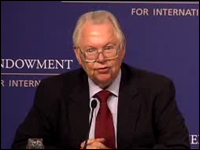Registration
You will receive an email confirming your registration.
With U.S.-Russia relations at a crossroads, several former ambassadors to Russia and the United States met to discuss how the two nations might move forward. Although relations between Russia and the U.S. are at a low point, and the exchange of official and unofficial charges and counter charges continues the downward spiral, the ambassadors insisted that cooperation between the two nations remains essential. They stressed the two countries’ shared responsibility for safely developing nuclear energy and preventing the proliferation of weapons of mass destruction. They noted also the economic interdependence of both countries and the potential benefits of cooperation in areas ranging from science to resolution of regional conflicts.
Next Steps for the United States and Russia
At the same time the ambassadors stressed the urgency for both countries to exercise restraint during this difficult time. They urged that the new administrations in Moscow and Washington should establish an improved and institutionalized bilateral framework that facilitates dialogue and oversees a coordinated approach to consultation and implementation of programs and policies.
Responses to Questions
The ambassadors responded to questions regarding the future enlargement of NATO , the Russia-Georgia conflict, proliferation of nuclear and other weapons of mass destruction, areas of cooperation between Russia and the U.S., and the issue of Russia claim to a region of privileged influence.
